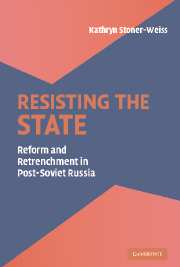Book contents
- Frontmatter
- Contents
- Acknowledgments
- Note on Transliteration
- Resisting the State
- 1 W(h)ither the Russian State?
- 2 Apparatchiki into “Entrepreneurchiki”: The Sources of Russia's Weak Central State
- 3 Governing Russia: Patterns of Regional Resistance to the Central State
- 4 Inside the Russian State: Assessing Infrastructural Power in the Provinces
- 5 Retrenchment over Reform: Obstacles to the Central State in the Periphery
- 6 Weak National Parties, Weak Central State
- 7 The Comparative Implications of Russia's Weak State Syndrome
- Index
2 - Apparatchiki into “Entrepreneurchiki”: The Sources of Russia's Weak Central State
Published online by Cambridge University Press: 25 July 2009
- Frontmatter
- Contents
- Acknowledgments
- Note on Transliteration
- Resisting the State
- 1 W(h)ither the Russian State?
- 2 Apparatchiki into “Entrepreneurchiki”: The Sources of Russia's Weak Central State
- 3 Governing Russia: Patterns of Regional Resistance to the Central State
- 4 Inside the Russian State: Assessing Infrastructural Power in the Provinces
- 5 Retrenchment over Reform: Obstacles to the Central State in the Periphery
- 6 Weak National Parties, Weak Central State
- 7 The Comparative Implications of Russia's Weak State Syndrome
- Index
Summary
As Chapter 1 noted, this book is devoted to explaining the weak political and administrative capacities of Russian central state institutions in the periphery following the collapse of the Soviet Union in December 1991.
A thorough analysis of this question, however, requires an examination of the institutional mechanisms by which the Soviet state extended its authority across the periphery. This too begs the question as to whether or not Soviet central institutions were all that successful in governing disparate territories. This is particularly relevant too in light of Putin's turn toward a more centralized, authoritarian rule of Russia's provinces in 2004, discussed in the concluding chapter.
In 1968, Samuel Huntington wrote admiringly that
[T]he one thing communist states can do is to govern; they do provide effective authority. Their ideology furnishes a basis of legitimacy, and their party organization provides the institutional mechanism for mobilizing support and executing policy.
But if the communist regime of the Soviet Union was so capable of governing, how and why did the system collapse? How did the nature of its collapse constrain the reform options for post-Soviet institutional designers? In what ways did these constraints and resulting decisions render Russian central state institutions deficient in penetrating provincial politics? This chapter responds to these fundamental questions.
One increasingly popular line of argument in the post-Sovietological literature puts the blame on Boris Yeltsin, Russia's first president, and his reform team of “neo-liberal shock therapists” as well as their foreign economic advisors.
- Type
- Chapter
- Information
- Resisting the StateReform and Retrenchment in Post-Soviet Russia, pp. 19 - 43Publisher: Cambridge University PressPrint publication year: 2006



